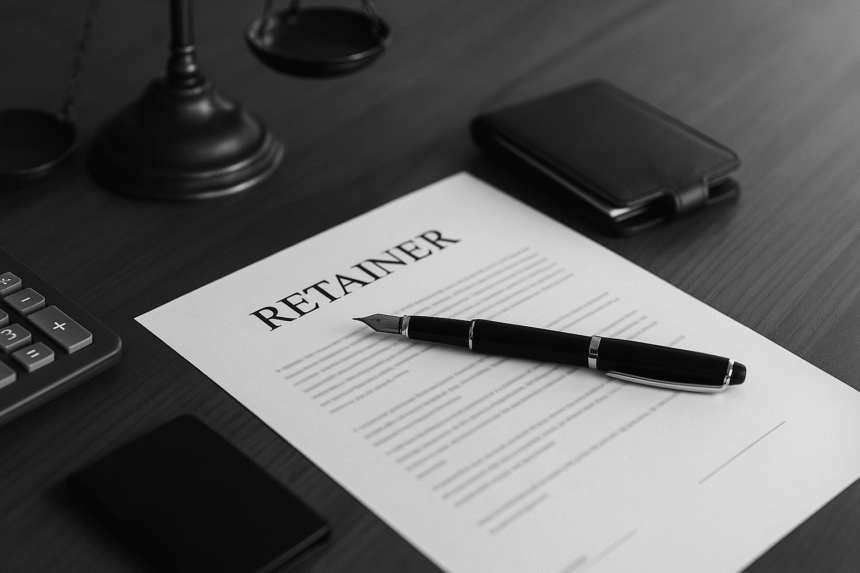A legal client retainer is a payment or contractual agreement made in advance to secure the ongoing services of a lawyer or law firm. It ensures the lawyer is available for future work and often outlines the scope, billing method, and duration of the legal engagement. Retainers are commonly used in long-term business relationships or to guarantee access to legal advice when needed.
Breaking Down the Definition
A legal client retainer can take several forms, but it always involves an agreement between a client and a lawyer. Here’s what it typically includes:
-
Advance Payment: A sum of money paid upfront to secure legal services.
-
Retainer Agreement: A formal contract outlining terms of the relationship.
-
Scope of Work: Defines what services are covered by the retainer.
-
Billing Terms: Can be hourly, fixed, or based on usage of the retainer funds.
-
Ongoing Relationship: Ensures the lawyer is available on-demand or on-call.
What It’s Not:
-
A retainer is not necessarily a flat fee—it may be refundable or adjusted.
-
It is not a guarantee of legal success or outcome.
-
It is not always used for litigation—it can cover advisory, corporate, or transactional work.
Why Legal Client Retainers Matter
Legal retainers are especially important in B2B services, startups, regulated industries, and high-risk business environments. Here’s why they matter:
1. Predictable Legal Support
Startups, consultants, and fast-growing companies often need legal input regularly—whether for reviewing contracts, responding to customer complaints, or updating policies. A retainer ensures they have timely access to legal expertise without having to start a new engagement each time.
2. Cost Control and Budgeting
With a retainer, legal costs can be estimated or capped over time. Instead of surprise hourly bills, clients know what they’re paying for—and lawyers can reserve capacity accordingly.
3. Continuity and Trust
A retainer fosters a long-term relationship. The lawyer becomes familiar with the client’s business, tone, industry, and risk profile—resulting in faster, more tailored advice.
4. Priority Access
Clients with a legal client retainer often receive faster response times and guaranteed access during emergencies. This is especially critical during compliance deadlines, product launches, or disputes.
Retainers are commonly used in industries like:
-
SaaS: For regular data privacy, IP, or licensing issues.
-
Real estate: For developers handling multiple contracts.
-
Healthcare: For ongoing regulatory and compliance questions.
-
Consulting: To outsource legal oversight without building in-house legal teams.
Legal or Practical Implications
Legal client retainer contracts help prevent misunderstandings between the client and lawyer. They also serve as proof of engagement if any disputes arise.
1. Contract Drafting
The retainer agreement itself must be carefully drafted. It should include:
-
A clear scope of services (e.g., “up to 10 hours/month for contract review”)
-
The fee structure (fixed monthly fee, hourly billing, or hybrid)
-
A clause on unused hours (whether they carry over or not)
-
Termination and refund conditions
Retainer contracts help prevent misunderstandings between client and lawyer. They also act as proof of engagement if any disputes arise.
2. Risk Allocation
From a risk perspective, a retainer reduces reaction delays. Businesses are more likely to consult a lawyer early—before risks escalate—if they’re already paying a monthly fee.
Retainers also help companies:
-
Document ongoing compliance efforts
-
Build audit trails for regulators
-
Reduce exposure to legal claims due to lack of counsel
3. Variations by Jurisdiction
In the U.S., retainers are regulated by state bar associations and may need to be kept in a separate trust account until earned.
In the EU, retainer relationships may require VAT invoices and compliance with GDPR when handling client data.
In the Gulf region (e.g., UAE, Saudi Arabia), retainers are commonly used by international companies working with local counsel to handle labor laws, regulatory filings, or language translations.
Example Clause or Use Case
Scenario: A fintech startup hires a legal consultant under a 6-month retainer to support licensing, investor term sheets, and user agreements.
Sample Clause from the Retainer Agreement:
“The Client agrees to pay a monthly legal client retainer of $2,500 to the Consultant. This fee covers up to 12 hours of legal work per month, including document review, drafting, and compliance consultation. Unused hours do not carry forward. Any work exceeding the 12-hour threshold will be billed at $250/hour, with prior written approval.”
Why It Works:
-
It defines scope and billing terms.
-
It gives the lawyer guaranteed income.
-
It gives the client budget clarity and priority access.
Legal client retainers are especially useful for early-stage startups that need flexible, ongoing legal support without hiring in-house counsel.
Call-to-Action
A legal client retainer can be one of the smartest legal investments a growing business can make. It creates legal readiness, speeds up decision-making, and builds a trusted advisor relationship.
👉 Need help setting up a legal client retainer?
Book a call to customize a retainer agreement, or download our Retainer Agreement Template for Consultants and Startups. Get clarity, structure, and support before legal issues arise.



Leave a Reply